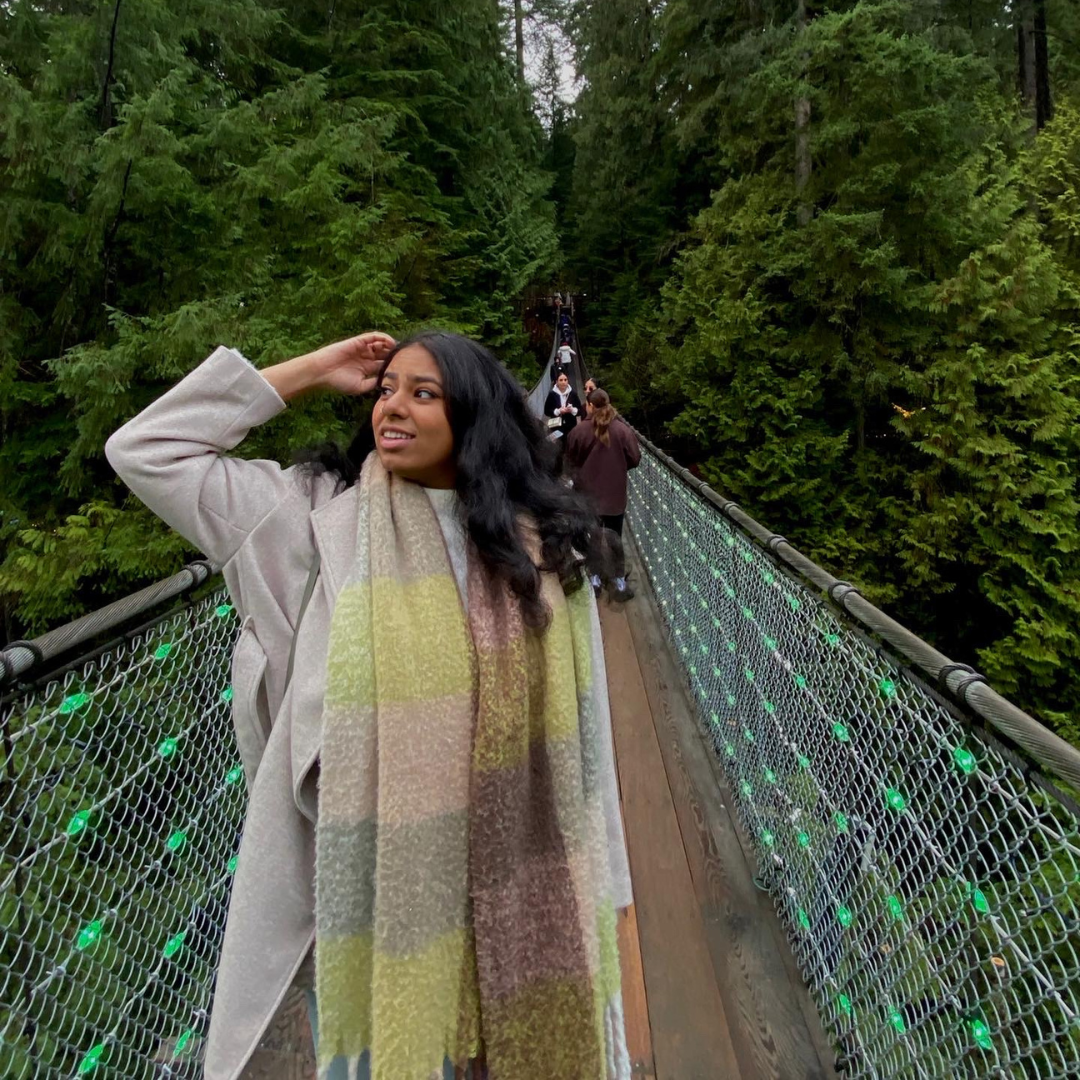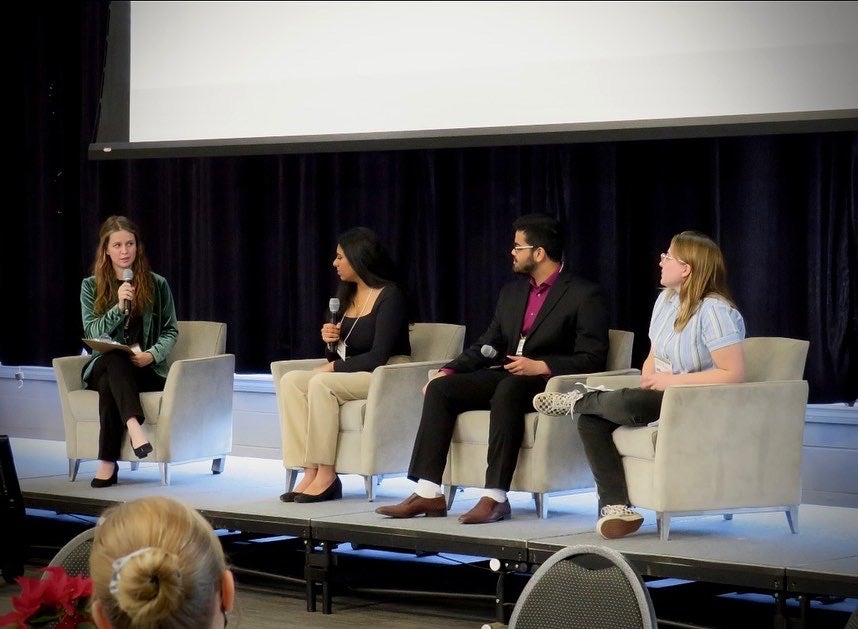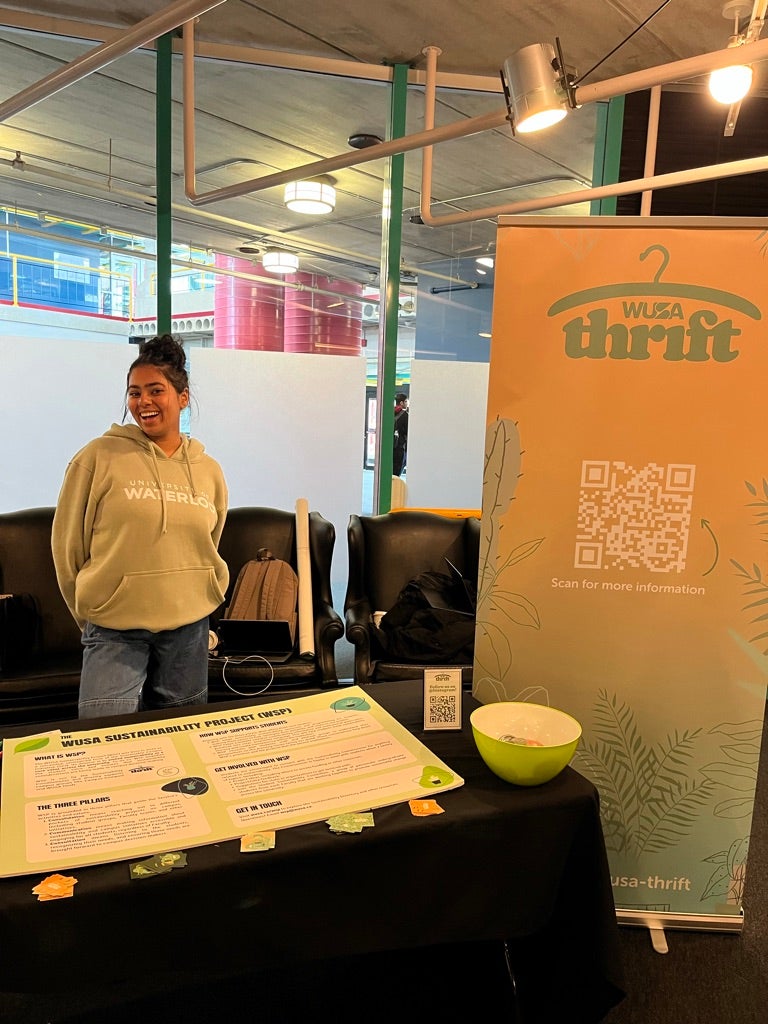Last month, I had the chance to speak with Shreya Rao (she/her), the current WUSA Sustainability Commissioner, about her work and how she got involved with the WUSA Sustainability Project (WSP). She’s also the WUSA Thrift Store manager this term, and our conversation was interspersed with cameos of people filtering in and out of the store.
Shreya is one of those rare people who is energetic in a way that also fills you up. Her enthusiasm and passion for sustainability were infectious. Our conversation often touched on the importance of engagement, mentorship, and inspiring others.
- Tell us about yourself.

Apart from being the WUSA Sustainability Commissioner, I am a career leader at the Centre for Career Action and a Waterloo student ambassador. I also paint and draw – I basically do everything in the arts. I was in a band throughout high school and play five instruments.
- What inspired you to get involved with WSP?
I first learned about Waterloo from a university fair. I was talking to the girl at the booth who gave me a brochure. When I got home, I spent two hours highlighting everything in it that I loved about Waterloo. I had the brochure in my backpack for all of 12th grade, manifesting that I would get in.
Once I got the offer letter, I started researching a lot more about the Faculty of Environment and came across Jenna Phillips, the Sustainability Commissioner at the time. I made a LinkedIn and started talking to her. She became a sort of mentor to me, and she told me about this position when it was opening up last year.
On a whim, I applied, but I felt like I wasn’t going to get it because I was only about to start my 2A term. During my interview, I remember I kept going on about how much I loved my program and Waterloo, and how much I would love to get the position.
That summer, I was working at a kids’ summer camp and I added a sustainability component to my role. We had workshops every week talking about sustainability. I would teach them how to recycle their garbage and about the environmental impact of activities we did.
It was lunchtime when I got the job offer. I told everyone I got the position and had all of these excited 5-year-olds run up to me. That was a powerful experience, because all these kids and their parents told me how meaningful everything I taught them was. I love working with people and seeing the impact that I can have. Sometimes I forget that these little things that I'm doing mean something to someone.
So that’s how I got into WSP. I really credit Jenna a lot for getting to where I am today. I didn’t know what my purpose in my program was or how to apply it in the real world, but she showed me ways that that was possible.
- What is a memorable story of a time you created an impact through your role?
I was a panellist at Eco Summit last year, which was the coolest thing ever. I’ve never spoken in front of a group of people that big. On top of that, people came up to me after and told me that I what I said really inspired them.
We did an exercise after the panel where people were given papers with prompts to reflect on the event. I was walking around, reading over what some of the people wrote.
Someone quoted something I had said in the panel, which was my answer to how older folks can help passionate young people in sustainability: “To all the students in the audience, make sure you’re investing time in people who believe in you.”
When I read that, I burst into tears. I wouldn’t have gotten to where I was if people didn’t believe in me. I wouldn’t have gotten to Waterloo if my mom didn’t encourage me to apply, or if my dad didn’t study Environment and shown me that that was something I could do. Especially in the Desi community, nobody goes and studies the environment. All my relatives and family friends would ask me why I wasn’t studying engineering or science. It’s just so out of the ordinary. But now I have little kids, 8 or 10 years old, who will tell me that I’ve done something no one has ever done before. Seeing someone repeat my words - seeing that on paper - was really impactful.

Shreya presenting at the "Connecting students with sustainability opportunities" panel at the 2022 Eco Summit (moderated by Bethany Poltl) alongside Saad Arif Qadeer and Ceileigh McAllister.
My vision for WSP is to turn it into a counseling type service where people, clubs, or faculties can come and ask me how they can be more sustainable. Right now, people think they have to be an Environment student to access those kinds of spaces, but I want to create a place that anyone can show up to. I want them to see me as a person, not an organisation - someone to guide and mentor them. This needs to be done in a more nuanced way, because forcing people to learn makes it undesirable and I’d rather it be a lifestyle change. I want people to feel the need to be sustainable without having to think about it anymore because it’s so ingrained in their mind.
- What more work needs to be done on campus to further sustainability?
Within WUSA, we’ve now established a circle of people who care about WSP. There’s a group of them rallying behind me to put more money in the next budget towards it.

Engagement is very important to me, which is why I’ve been focusing so much on developing personal relationships. Once people see how involved I am with this, they start to do so too. My friend is in nanotechnology engineering, which is not necessarily the most sustainability-related program. After seeing how passionate I was, she was inspired to apply to the Student Sustainability Committee.
- How can undergraduate students get more involved in sustainability?
Join us at our SDG Week events! We have a keynote and sustainability professionals networking session happening on Wednesday, March 8th. This will be held collaboration with SDSN Canada, and will feature a keynote speech from Brighton Kaoma (SDSN Youth Global Director).
In addition to this, WUSA Thrift is hosting a sale on March 8th from 12-5 pm in the SLC multipurpose room.
For more information, connect with Shreya directly at wsp@wusa.ca. Follow the WUSA Sustainability Project (@wusasustainability) and WUSA Thrift (@wusathrift) on Instagram.